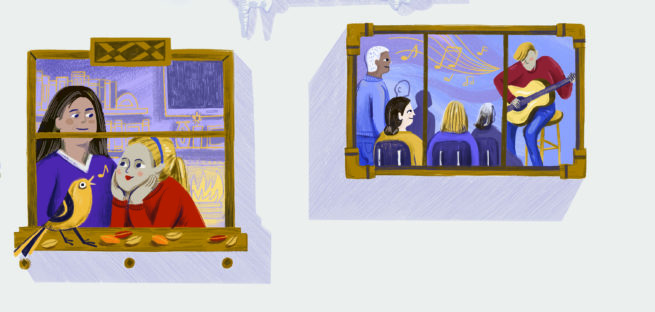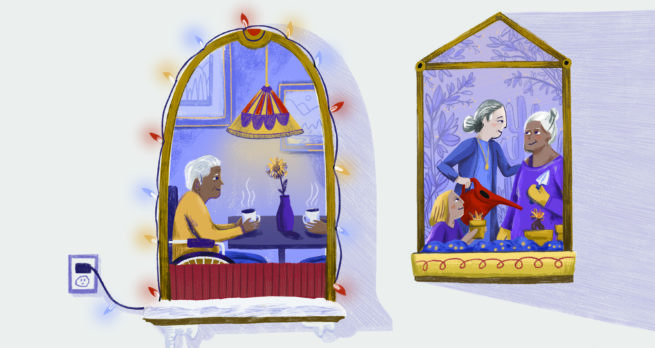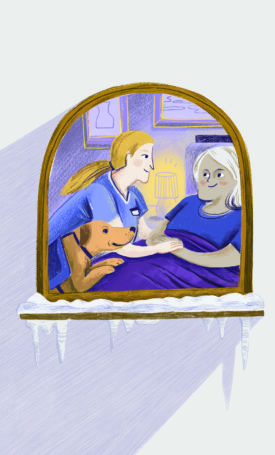January 14, 2019
Pilgrims Hospice planning city’s first stand-alone residential hospice
Most people say they want to die at home, but such a simple request can be hard to fulfil.
“Unfortunately, that can become unrealistic in the last months, weeks and days of life because the burden on caregivers becomes so high,” says Monica Robson, executive director of the city’s Pilgrims Hospice Society.
While the non-profit organization eases the burden by offering a multitude of at-home and day-program services for people living with life-limiting illness, as well as for their families and friends, never in its 24-year history has it offered residential care.
That gap strains not only families, but also the health-care system, says Robson. “Often people end up in the ER and then, although they do not require the intensity of resources or services provided, they remain waiting in hospitals because they can’t be cared for properly at home.”
Pilgrims Hospice plans to change that, very soon.

Fundraising is underway to build the city’s first free-standing hospice (that is, not attached to a hospital or long-term care facility) that’s designed to include 12 residential hospice suites. The new facility will go up on the current site of Pilgrims Hospice a former convent in the west-Edmonton neighbourhood of Crestwood), with construction starting as early as mid-2019.
Edmonton Community Foundation is supporting the $15-million project through several of its donor-advised funds (funds in which the donors specify how the money should be used to assist the community).
One, a $100,000 grant created by an anonymous donor, will underwrite the construction and installation of a spa room and therapeutic tub. Two smaller ECF donor-advised grants of $20,000 and $10,000 are supporting the capital campaign, while a third, for $10,000, is earmarked for the campaign in 2019.
“We’re very fortunate, ECF is an exceptional community foundation,” says Robson, noting the organization’s extensive community connections and expertise in matching philanthropic goals with
organizations in need.

The new building will allow Pilgrims Hospice to seamlessly integrate its services. Robson imagines a centre where newly diagnosed individuals (and their loved ones) can attend Pilgrims’ community programs, use the non-profit’s services and connect with the hospice community, before coming to the centre as residential clients. After a patient has died, their loved ones can return
to the centre for bereavement support.
Since 1994, Pilgrims Hospice has developed a thoughtful slate of helpful programs and services. Through the Adult Respite Day Program, clients can visit the centre three days a week for recreational programming, interaction with peers, a meal and an opportunity to meet with a counsellor.
“It provides socialization and time spent in a warm, caring environment where people feel that they are understood,” says Robson. “And their caregivers can get some respite as well, as many feel they cannot leave [their loved ones] alone.”
The Compassionate Companions program offered by Pilgrims Hospice dispatches caring volunteers into the community to visit clients. Typically, volunteers spend the time just talking with sick people in their homes: “It’s an opportunity for them to talk with someone who isn’t fixated on their illness,” says Robson. It’s not unusual for volunteers to help with specific projects, as well — like documenting clients’ life stories or scribing letters for clients to leave for loved ones.
As a local family doctor focused on palliative care, who refers his patients to Pilgrims, Dr. Dinesh Witharana says that managing the pain and discomfort associated with a patient’s medical condition covers only part of their needs. Palliative care is also about helping patients stay connected with their communities and avoiding social isolation.

Recently, Witharana’s own brother was diagnosed with a life-limiting illness and is now a client of Pilgrims who uses the Compassionate Companions program. His brother is happier and not as isolated in his home. “Before his illness, he had a very social life,” says Witharana. “Pilgrims Hospice has helped him reconnect with people, and for him that’s better than medicine.”
Through another program, called No One Dies Alone, volunteers are sent to the bedsides of people who are in the final stages of dying. There, they simply hold the patients’ hands and speak to them to offer comfort during their final days, hours or minutes. Sometimes, these patients have family and friends who cannot be at their bedside 24-7; other times, patients aren’t receiving visitors at all.
Pilgrims Hospice also offers bereavement counselling for adults — and for children, teens and families — who have lost loved ones. Programming includes both drop-in and closed group sessions, and one-on-one counselling. Robson says the counselling programs aren’t restricted to families of those who’ve died from a terminal illness. Clients of the non-profit have had loved ones die from many different causes, including suicide, overdose and accidents.
The new Pilgrims Hospice facility will continue to offer all of these programs, while its new residential program will allow caregivers to return to their primary roles as wives or husbands or children.
“In their last weeks of life, we want people to have those relationships back,” says Robson.
As Witharana points out, in palliative care the focus isn’t on “fixing” patients but on maximizing their quality of life. “If they’re happy and comfortable, you’re doing your job well.”
Listen to an interview with Monica Robson about Pilgrims Hospice and Edmonton’s first residential community hospice centre on The Well Endowed Podcast.